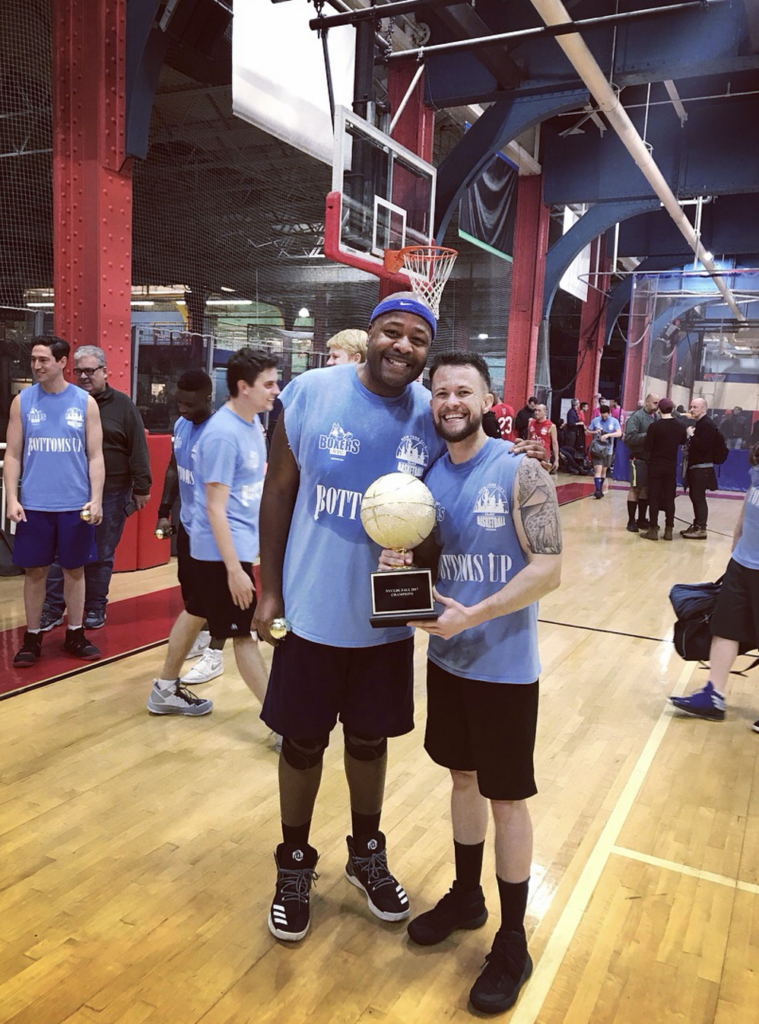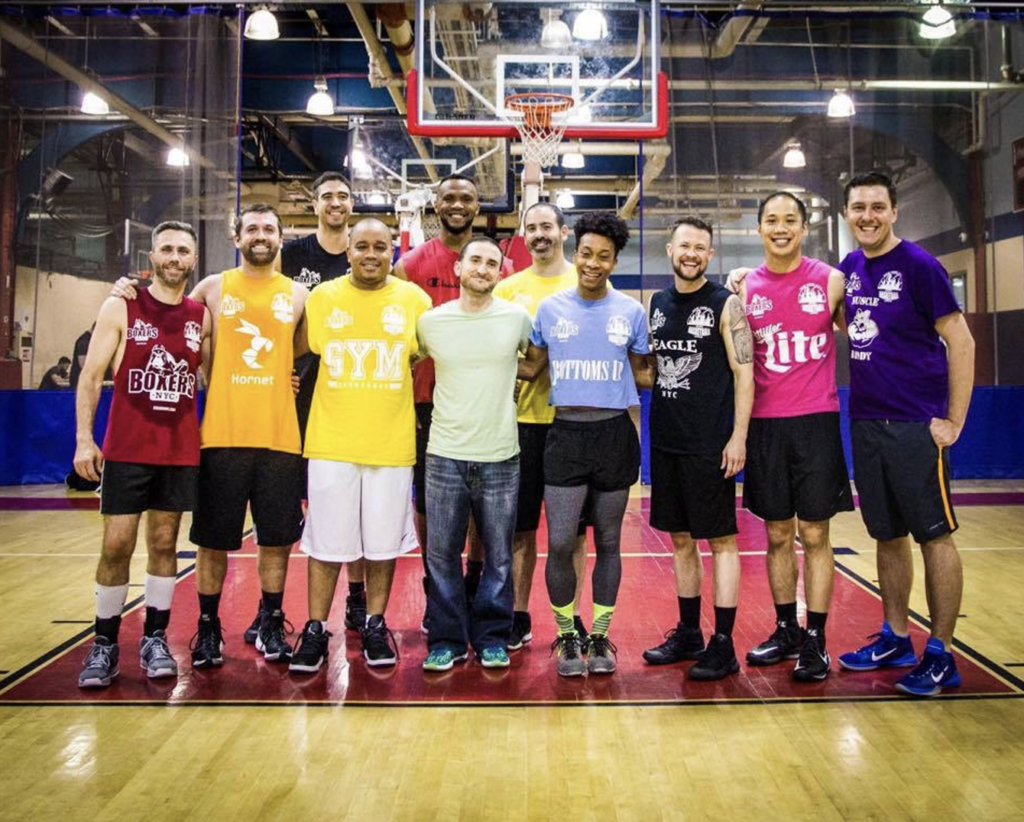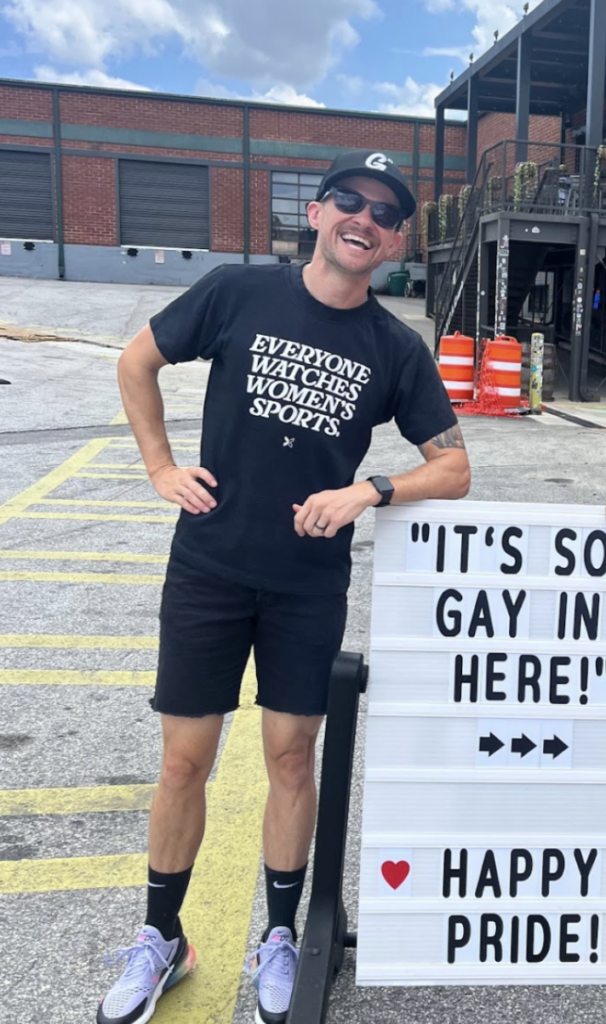By Carl Charles, Lambda Legal Counsel
As the final seconds ticked off the scoreboard, I felt the adrenaline and emotion overwhelm me as I looked over to the stands packed full of my classmates, friends, and family.
In 2002, I was the starting point guard for the 26-0 undefeated Colorado Springs Christian High School Girls Basketball team. We had just notched our final win of our season —the Colorado Class 3A State Championship game — and I felt an ecstatic, overwhelming joy that still gives me goosebumps to think about more than 20 years later. When the game ended, I ran to the side of the court with our fans and the school band and jumped up and down, yelling “WE DID IT — STATE CHAMPS!!” whipping them into a frenzy of celebration.
Sports have been a part of my life since the very beginning. In elementary school, I learned to shoot on a nerf basketball hoop next to our small color TV where I watched Michael Jordan and the late ‘80s Chicago Bulls. Later, in middle school and early high school, I was a “three sport athlete,” running cross country in the fall, followed by basketball over the winter and soccer in the spring.
In the summers of high school, I was part of a competitive AAU/traveling basketball team for an audience of university scouts. While I only played one year of NCAA Division II basketball, after college I coached several junior varsity and varsity high school basketball teams. And after graduating from law school and starting my first job as a lawyer in New York City, I played several seasons in the men’s division of Pride Basketball NYC, the LGBTQ+ basketball league.
How Sports Saved My Life
As an LGBTQ+ person, watching, playing, and coaching sports has never been a one-dimensional endeavor for me. Growing up in a strict religious environment, playing sports was a means to survive until I could live freely and authentically as myself. Being an athlete created friendships that made navigating the social challenges of high school as a gender-nonconforming young person less painful. Meanwhile, my participation in school sports was the singular path of peace with my parents, who closed off every other social avenue of my life because of my burgeoning LGBTQ+ identity.
Sports gave me an outlet for a difficult home life, and provided a place of structure, consistency, and fairness — concepts that rarely existed elsewhere in my life. And finally, sports taught me coping skills for dealing with disappointment, anger, frustration and at times, despair, helping me learn how to navigate the most difficult parts of life with composure and resilience.
Experiencing sports from every dimension — as a fan, player, and coach — has also helped me understand how it permeates throughout society. Whether or not you play or watch, there’s no denying that sports create culture and opportunities for connection between often very different people.
Many times, I have found that the most accessible common ground with someone I don’t know is a conversation about the local sports team or national sports news. Thanks to my access to and love of sports from an early age, I’ve always felt comfortable in those discussions. These chats often help in finding other shared interests, or serve as a bridge to talk about other important cultural issues like racism, workers’ rights, LGBTQ+ rights, or pay equity.
Fighting for the Right for Trans Kids to Play and Thrive
So why does any of what I just said matter?
It matters because when we exclude transgender youth from sports, particularly in primary and secondary school when the stakes are low and participation is the main goal, we exclude them from much bigger things like society, culture, and connection.
Exclusion from this wide cultural milieu during school age years ensures trans youth face sometimes insurmountable barriers to building connections through sharing a love for a game, a team, and the togetherness that is sports at its best. Excluding trans youth from school sports also means they lose out on the numerous and well-documented positive benefits that flow from athletic participation: friendship, teamwork, communication, leadership skills, composure, confidence, patience, dedication and resilience. The opportunity to develop these life skills through sports is incredibly critical for trans youth, who face mounting opposition to even their very existence from powerful institutions like the federal government and hateful anti-LGBTQ groups like the “Alliance Defending Freedom,” who have bankrolled the dishonest and manipulative rhetoric around trans young people playing sports.
And that’s why, when Lambda Legal goes to the Supreme Court again in January 2026 to defend our Fourth Circuit victory in B.P.J. v. West Virginia State Board of Education, we do so knowing that we are fighting for our client’s right to continue to participate in the sports she loves, but also for her right to become an adult that continues to build connections with other people through sports.
Everyone deserves that opportunity, especially trans people, who in response to exclusion from mainstream participation have built their own inclusive teams and leagues like the all trans and nonbinary hockey team, Team Trans; the all trans streetball pickup basketball league, The Basketdolls; and Fenix FC, the first all trans men soccer team. Though these trans specific groups are to be celebrated, their existence does not condone the separate but equal approach, or the all-out exclusion policies of the NCAA and the U.S. Olympic and Paralympic Committee.
After I finish writing this blog, I’ll get ready to attend an Atlanta Dream game, the WNBA team I’m proud to support here in Georgia. Twenty years after becoming a state champion, and 15 years after coming out as a transgender man, watching and playing sports still brings me so much joy and connects me to meaningful experiences in my past and present. To this day, I still enjoy and am forever grateful for my friendships and connections that are rooted in a shared love of all the things that make sports great.
Trans youth and adults need and deserve access to sports, and the culture and connection it brings, which can be a bright and sustaining light to help us survive life’s biggest challenges.
Join us in support of trans youth like BPJ (Becky Pepper-Jackson) on Jan. 13, 2026, and help us defend sports, and schools for all. We, alongside our national coalition and state partners led by Lambda Legal, ACLU, the Transgender Law Center and GSA Network, will be outside the Supreme Court in Washington, D.C., and in solidarity in cities across the country to come together to say clearly: We Fight for Team Trans Youth. And we need you with us! Find a rally near you on our site “Together We Win: Fight for the T in Team.”




